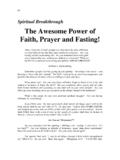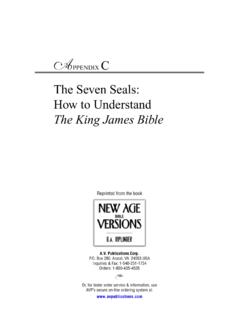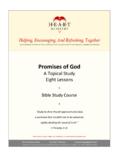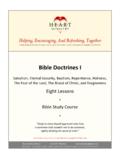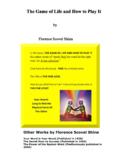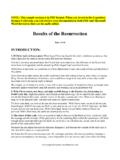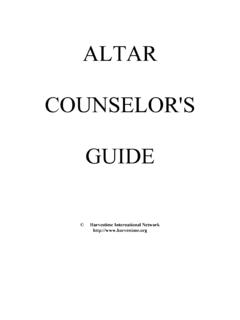Transcription of THE MEANING OF JOHN 20: 21 - 23 - bibleissues.org
1 Controversial Bible Issues 1 of 10 THE MEANING OF JOHN 20: 21 - 23 By Denver Cheddie 21 Then said Jesus to them again, Peace be unto you: as my Father hath sent me, even so send I you. 22 And when he had said this, he breathed on them, and saith unto them, receive ye the Holy Ghost: 23 Whose soever sins ye remit, they are remitted unto them; and whose soever sins ye retain, they are retained. This presents one of the most difficult Biblical passages to interpret, and one that can easily be used to propagate false doctrines if not done properly, as has been the case[i].
2 Many, in approaching a difficult bible passage, interpret it in such a manner so as to somehow fit it into their overall predetermined theology, which is to say the least very subjective. It also allows the interpreter to either read into the passage what it does not say or explain away certain elements that do not conform. I will attempt to interpret this passage in the given context to determine the MEANING that was understood by the initial hearers and the MEANING intended by the speaker[ii]. I will use this principle of interpretation to defend the position that John 20:22,23 refers to the authority Jesus gave to exercise discipline in the church.
3 Some Preliminary Questions Controversial Bible Issues 2 of 10 There are several questions that must be answered to properly understand this passage. 1) To whom precisely was Jesus speaking? 2) What did He mean in this context when He said, receive the Holy Spirit ? 3) What did He mean that the recipients would be able to forgive and retain sin? Before I give my understanding of the passage, let us consider some common interpretations offered to answer these questions. Jesus Intended Audience Various views are that the audience was 1) the 11 apostles, 2) Peter alone, 3) all disciples present, and 4) all believers of all time.
4 There is nothing in the text to substantiate the view that the promise was given to Peter only or the 11 apostles alone. It is argued that John 20:23 resembles Matthew 16:18, 19 where it may appear that Jesus was specifically addressing Peter. Matthew 16:18 And I say also unto thee, That thou art Peter, and upon this rock I will build my church; and the gates of hell shall not prevail against it. 19 And I will give unto thee the keys of the kingdom of heaven: and whatsoever thou shalt bind on earth shall be bound in heaven: and whatsoever thou shalt loose on earth shall be loosed in heaven.
5 However the same promise as Matt 16:19 is repeated in Matthew 18:18, where Jesus' audience seems to be all who would become church leaders. It is also unlikely, in John 20, that Jesus was referring to all believers of all time since this was a unique experience distinct from Pentecost where physical Jesus physically breathed on the group present. The empowering Controversial Bible Issues 3 of 10and inner transforming aspects of the Holy Spirit s ministry that took place at Pentecost[iii] are available for all time (Acts 2:38,39), but the reception of the Holy Spirit in John 20:22 is distinct.
6 It most likely was referring to all present and as I will argue later to all church leaders in subsequent generations. The MEANING of receive the Holy Spirit One view is that Jesus was simply promising the disciples that the Holy Spirit would come at a later time, which turned out to be the Day of Pentecost. This view hardly does justice to the text. It seems to me that the act of breathing on them suggests that they received something right there and then. Surely the mighty rushing wind of the Spirit did not move in slow motion. Another view is that it was a full outpouring of the Holy Spirit on the apostles prior to Pentecost.
7 Again this has to be rejected since both Jesus and the disciples referred to the full outpouring as yet future even after this event (Luke 24:49; Acts 1:4,5,8). A third view is that the giving of the Holy Spirit was an act of recreation. Just as God breathed physical life into Adam, Jesus breathed spiritual life into His disciples, which for others occur at conversion. This view seems to be common among commentators[iv]. However this interpretation implies that there would have been a transformation in the lives of those who received this impartation.
8 But is this the case? Peter s Controversial Bible Issues 4 of 10question in John 21:21, What about this man [John]? , suggests that he still saw John as a rival as he did before Jesus breathed on them. The real transformation took place after Pentecost not before. Furthermore Biblical evidence militates against this view since the Holy Spirit could not come to reside in believers before Jesus was glorified (John 7:38,39; 14:17; 16:7). He was with them all along and had certain inputs in their lives but could not reside in them at this point. Thus this interpretation, in my view, is not correct.
9 The MEANING of Forgiving and Retaining Sin Some believe that the apostles were given power to forgive sins in a direct and absolute sense. Firstly this view is inconsistent with Luke 5:21 which states that only God can forgive sin. If this interpretation is correct then the Bible has unexplainable discrepancies. The question to ask concerning this view is did the disciples understand Jesus pronouncement in this manner? The answer is a resounding no. At no point in the Bible is there even a hint that the disciples went around forgiving and retaining people s sins in that sense.
10 Evidence is lacking that the original hearers understood it in this manner, and neither should we. Catholics further stretch the unimaginable by claiming that Jesus was not just speaking to all present, but to Peter in particular (not in the least hinted by the text), Peter was later to become the first Pope in Rome (historically very debatable), and the promise of forgiving and retaining sins was passed on to all subsequent popes (absolutely ridiculous!) Controversial Bible Issues 5 of 10 Others see it as authority to announce the terms of conditions for having one s sins forgiven ( preaching the gospel) or the right to declare whether or not someone s sins are forgiven based on their response to the gospel.


